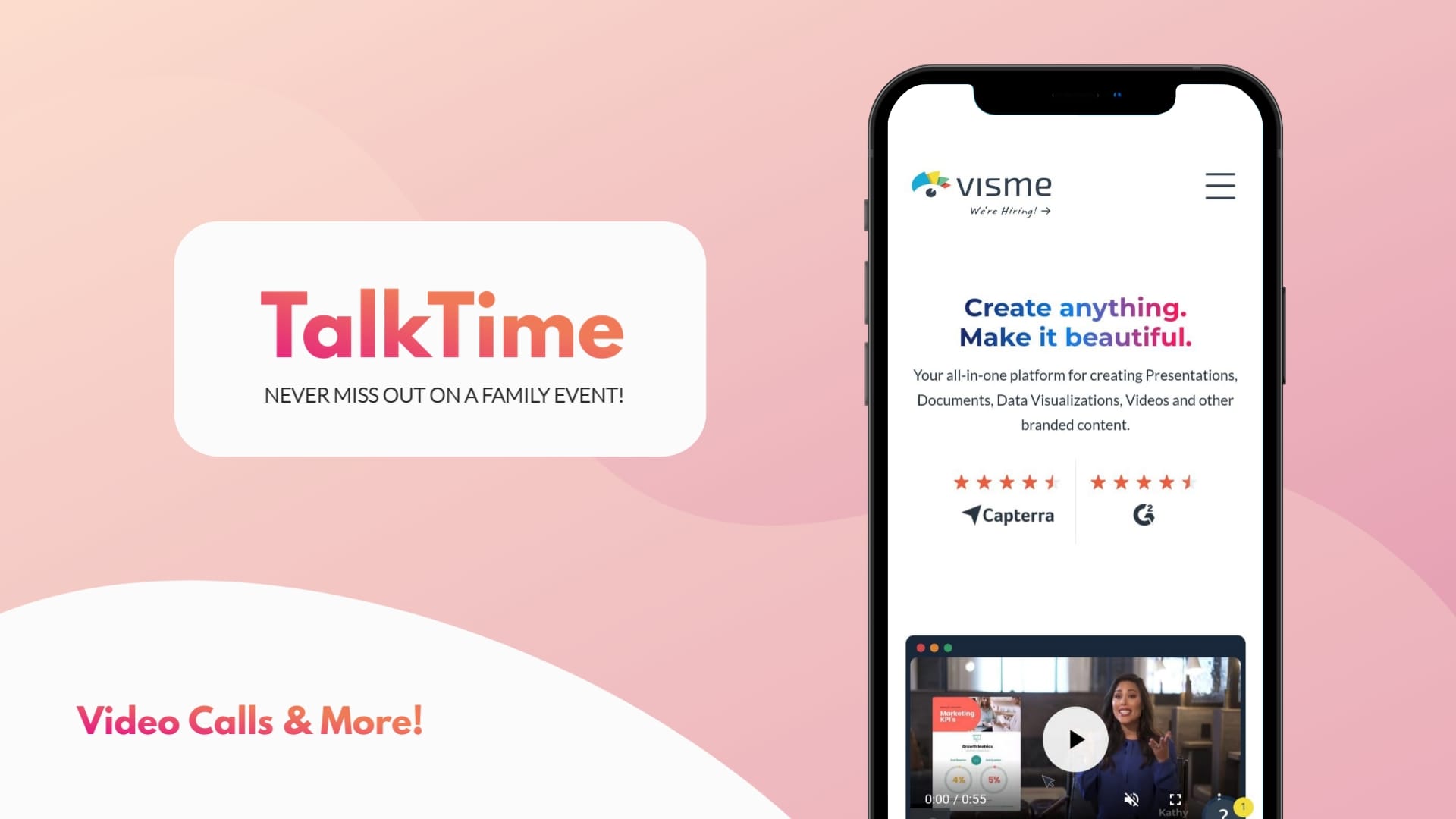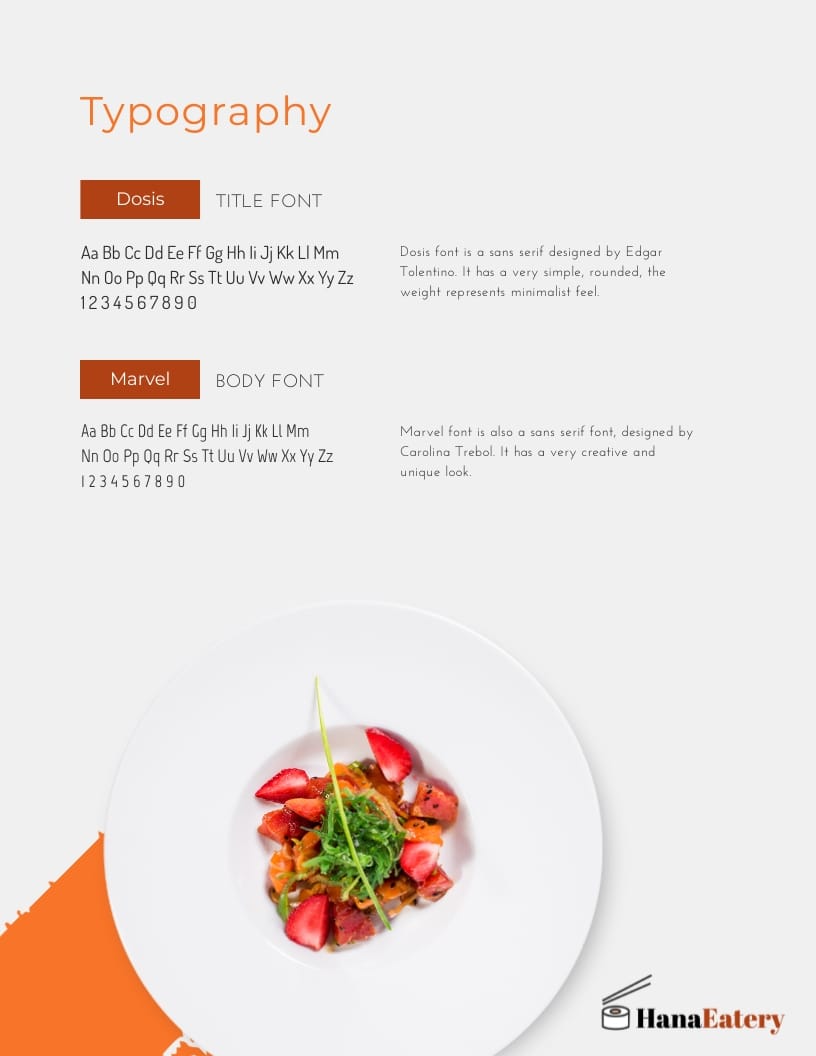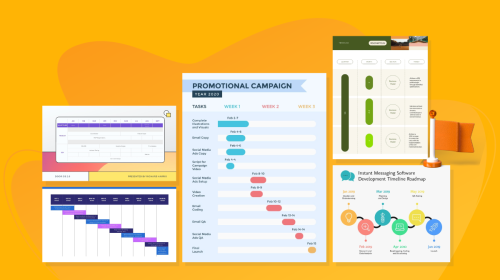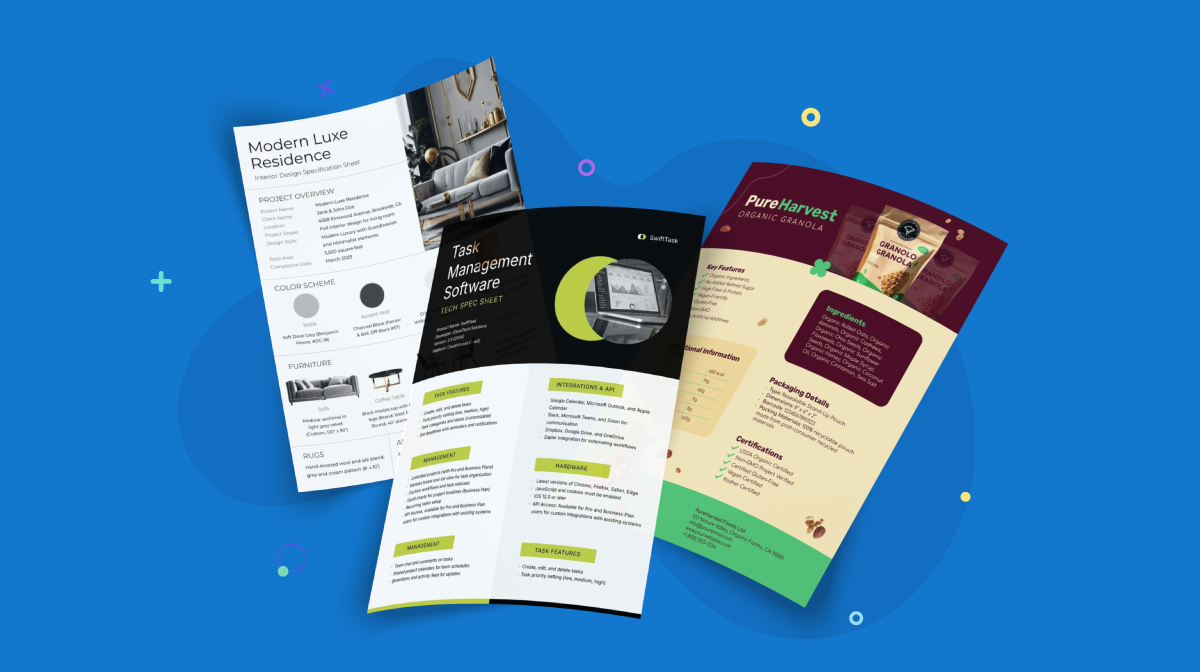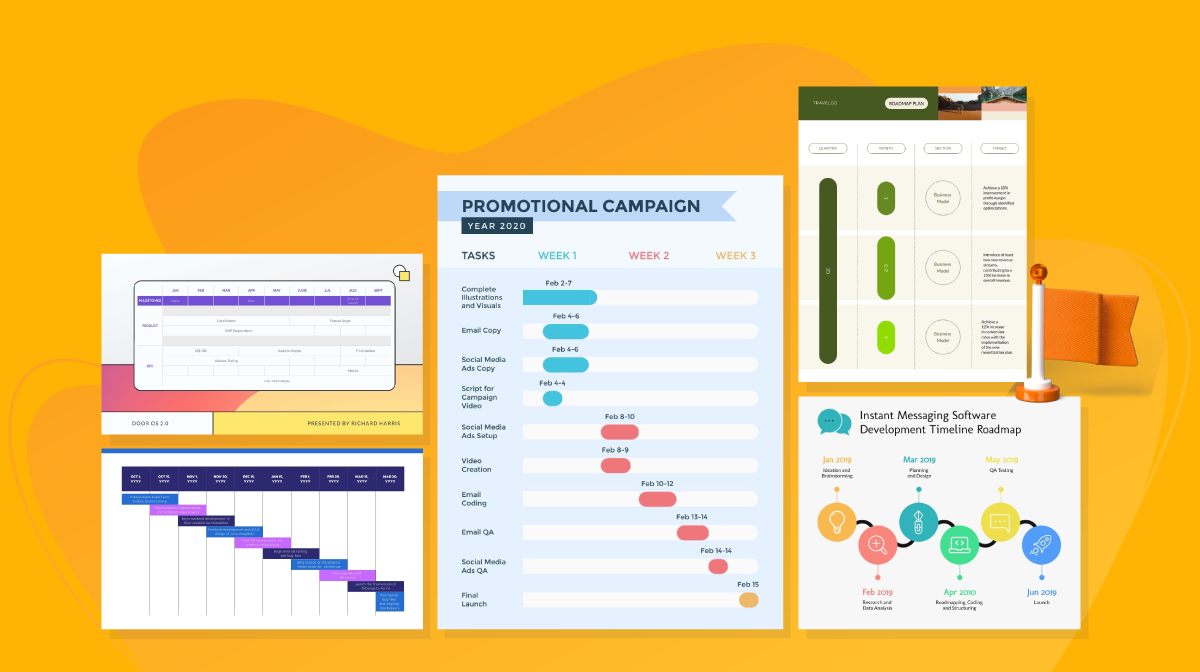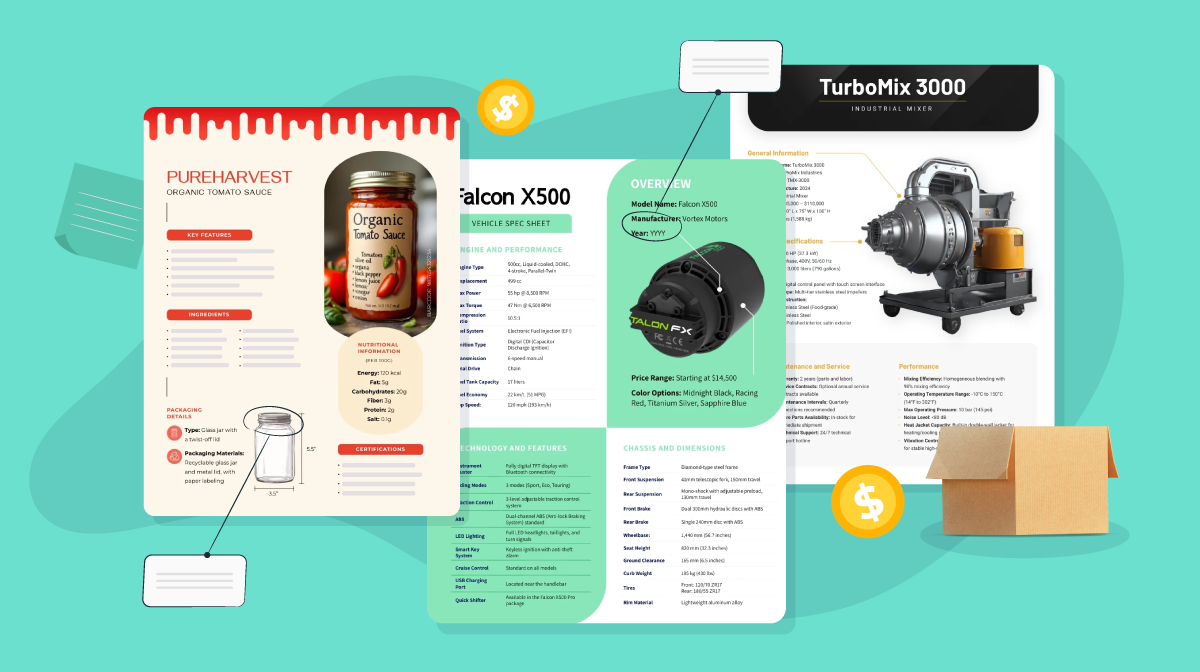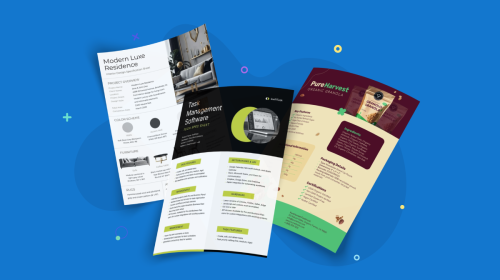
The Designer’s Guide to Mockup Website Designs: Best Practices & Mistakes to Avoid

You wouldn't dream of constructing a house without first establishing its blueprints. The same logic applies to creating a website: the mockups serve as architectural blueprints.
Mockup website designs allow designers to test their ideas, experiment with different layouts, and create the best possible design for their projects. It's an excellent strategy for drawing attention to website design projects and allowing viewers, clients, or investors to visualize how the finished product will look and function.
If you want to take your mockup website design game up a notch or two, then this guide is for you. In this post, we will discuss the best practices and common mistakes to avoid when creating a mockup website design. We will also provide templates to help you make the most out of your mockup website designs.
Here’s a short selection of 6 easy-to-edit website mockup templates you can edit, share and download with Visme.
Table of Contents
- What is a Mockup Website Design?
- Mockup vs WireFrame
- Best Practices for Creating a Mockup
- 6 Common Mistakes When Creating a Mockup
- 5 MockUp Website Templates to Use
What is a Mockup Website Design?
A mockup website design is a visual representation of how a website will look and function after it is built.
It is used to demonstrate the structure and layout of a website and to test and iterate on design ideas before building the actual website. Website mockups add form and style to navigation menus, links, buttons, forms, and sliders, providing the core visual aspects of design accessibility and usability.
By creating a mockup website design, you can easily review different versions of the design, fine-tune the interface, and ensure the overall user experience is exactly as intended.
Developers can also carry out their projects more accurately when they have access to a thorough and detailed website mockup. They facilitate developers' work, particularly when coupled with a design system that details the look and feel of the site down to the last pixel with a comprehensive style guide, design specifications, patterns, and components.
Lastly, designing website mockups makes it much easier to communicate and share design ideas with clients at an early stage of development, allowing the client to give feedback on the design before costly development work is done.
Mockup vs WireFrame
A mockup website design is a visual representation of the website with images, colors, fonts, and other elements that have been selected to create the look and feel of the website. On the other hand, a wireframe is a diagram of the website’s structure and layout. It typically contains only lines and boxes, which represent the different components of the website, such as navigation menus, header and footer areas, content areas, and so on.
Mockups can also be used for user testing, as they provide a more realistic view of the website. Wireframes are generally not suitable for user testing as they lack any graphical elements or styling. However, website prototypes are typically made using a combination of mockups and wireframes.
Made with Visme Infographic Maker
Best Practices for Creating a Mockup
Here are some best practices that can help you create effective mockup website designs:
Start with a Wireframe
Jumping straight into the design without a clear plan can lead to a cluttered and disorganized mockup. The website wireframe provides an overview of your design’s structure and layout.
Since wireframes are preliminary and developed quickly, they can undergo significant revisions. At this point, it's easy to make significant changes by just rearranging the parts. This will help ensure that all elements fit together correctly and create a great user experience.
Here's a great example of a professional website wireframe template by Visme that'll make your wireframe creation a walk in the park.
Use a Design Template
If you don’t have time to create the entire mockup from scratch, then consider using a pre-made template. A design template will provide you with a framework for quickly building a website design, allowing you to focus on making minor tweaks and customizations to the design.
With Visme's wide library of mockup templates, you can quickly and easily create high-quality, professional mockups that can be customized to suit your needs.
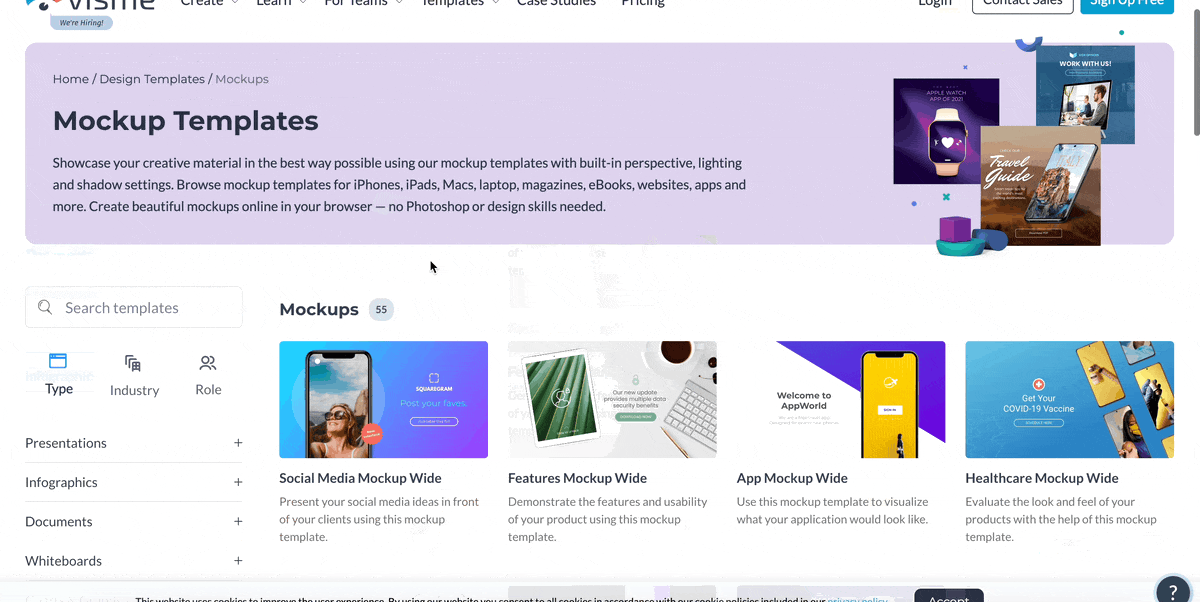
Focus on the Visuals
Visuals are often the first thing that users will see and interact with on a website. Therefore, when creating a mockup website design, it is important to take note of the following:
- Your site's navigation elements and call-to-action buttons should be designed to be simple, intuitive, and eye-catching without being overwhelming.
- Keep the layout simple and uncluttered. Make use of white space to divide sections and draw the reader's attention to important details.
- Incorporate your brand's colors and ensure appropriate contrast and aesthetically acceptable color combinations.
- Both the body copy and the microcopy should employ attractive, complementary typefaces. Locate a set of fonts that complement each other and work well together to avoid giving your users a disorienting or uncanny experience.
- Use consistent design language throughout the mockup. Elements like font choices, color schemes, and layout should be consistent.
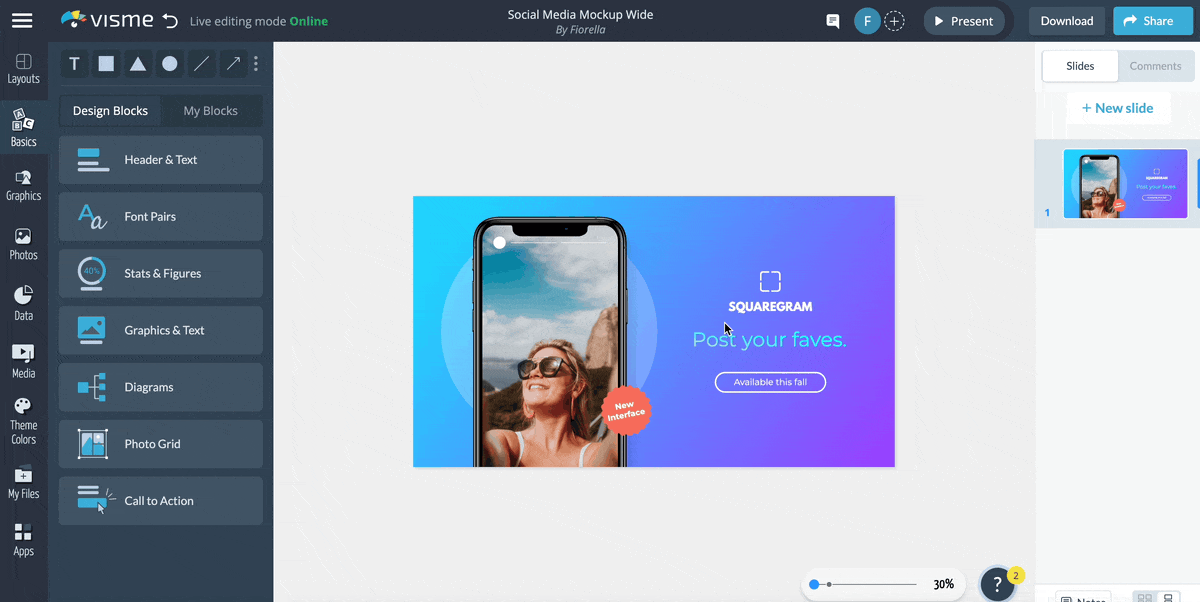
Adopt a Mobile First/Responsive Design
With the increasing use of mobile devices to access the internet, it is important to design a responsive mockup that looks good on different screen sizes.
Mobile devices now account for roughly 55% of all internet traffic. So you want to ensure your images, videos, and posts are optimized for viewing on smaller screens.
If you put in the time to plan out the structure of your mobile site at the outset, you may avoid the hassle of adapting a desktop design for mobile users. Also, it increases the likelihood that your finished product will look great on all platforms.
Luckily, you can create responsive mockups with Visme, so you don’t have to worry about it being difficult to read on a small screen. Any page you create with Visme's website mockup templates is fully responsive and mobile-friendly.
Design Tip: Do you want to show off your design on more devices? Select mockup elements from the Photos > Mockups menu on the left side of the Visme mockup-generating interface. You can choose to showcase a laptop or desktop screen, a tablet, and a phone in your website mockup.
Keep It Simple
Avoid adding too many unnecessary details or elements to the mockup. Instead, focus on the core features and functionality of the website or app. For every interface element you design, feature and action in the user flow, always ask yourself this question: how can I simplify this for the user?
Failing to consider the user's journey through the website can result in a mockup that is non-intuitive or difficult to navigate. Use real data in your mockup to make it more accurate and representative of the final product. This can help you identify any issues with the layout, user flow or functionality.
Simplify content creation
and brand management for your team
- Collaborate on designs, mockups and wireframes with your non-design colleagues
- Lock down your branding to maintain brand consistency throughout your designs
- Why start from scratch? Save time with 1000s of professional branded templates

Test and Iterate
Once you have created your mockup, it is essential to test it to ensure it works as intended. You can do this by testing the functionality and usability of the website in various browsers and on different devices.
Consult users or other stakeholders to ensure the mockup meets their needs, requirements and expectations.
You should also obtain as much user feedback as possible, whether through an elaborate survey or just a casual chat session with coworkers. Take note of their feedback on the following aspects: font, spacing, color, placement of navigational elements, visuals, icons, usability, and accessibility.
6 Common Mistakes When Creating a Mockup
Taking the time to understand and avoid common mistakes when creating a mockup website design will help ensure that your final product is effective, efficient, and well-received by stakeholders and users alike.
Let’s run through the most common mistakes to avoid when designing a mockup website.
Making It Difficult To Interact With the Mockup
The goal of a mockup is to provide a realistic representation of the website’s functionality and user experience. If your mockup does not allow for easy interaction, such as clicking buttons and navigating between pages, it can be difficult to adequately test the user experience.
Not Considering Responsiveness
A key aspect of any website design is ensuring it is responsive and looks good on different devices and screen sizes. A mockup should be tested on multiple devices and screen sizes to ensure the design works across all platforms.
Ignoring Brand Guidelines
Not following the brand guidelines can result in a mockup that isn’t cohesive with the company's image and messaging. It is also important to pay attention to small details that can have a big impact on the overall look and feel of the site. This includes fonts, colors, graphics, spacing, and other details that can impact the user experience.
You should also avoid overcomplicating the design and adding too many unnecessary elements or features, as this can make the mockup confusing and overwhelming.
Creating stunning branded content for your website mockups is easier with Visme's Brand Design Tool. Our AI-powered brand wizard can generate templates with your company's branding in just a few seconds.
Here’s a template to help you put together a detailed brand guideline for your company.
Not Considering the Target Audience
Failing to consider the needs and preferences of the target audience can result in a mockup that does not appeal to them.
It's important that you start designing your mockups with a clear idea of your target audience and their needs. This will help guide your design decisions and ensure that the mockup meets the needs of the people who will be using the site.
Not Using Real Data
Using dummy content or data can result in a mockup that does not accurately represent the final product.
Even if not all of your site's text, graphics, and media are finalized quite yet, include as much as possible in your mockup. Using placeholder text to preview a website's layout and design might not provide an accurate picture of the final website.
Visme has an extensive library of high-resolution images and graphic elements that can help you create stunning designs on your mockup.
Not Keeping the Final Product in Mind
Focusing too much on the mockup and not considering the constraints and limitations of the final product can lead to a design that is not feasible or practical.
For instance, don't risk confusing the client with a 3D design mockup when this won't be feasible in the final product. Instead, show them a mockup of exactly how it will look before you hand it off.
5 MockUp Website Templates to Use
Ready to create your mockup. Here are five mockup website templates you can use right away.
1. Platform Mockup
Let's say you are in charge of a group of designers working on a rebranding project for a client's website. This template below can come in handy for displaying a responsive design.
It can give your client a comprehensive idea of how their landing page could look on various devices. To have the website's final presentation available, simply take a screenshot of every size and place it inside each device mockup.
2. Clinic Website Mockup
Use this mockup to impress potential clients with your innovative website design concepts. Make sure your designs fit the brand's identity as you play around with different color palettes and filter effects.
Looking for more ideas? We have an extensive media library with icons, stock photos and videos, and illustrations that may be used in any creative project. You can also collaborate with team members to create the perfect designs using our intuitive tool.
3. Management App Mockup
How about using a clean, sleek and professional-looking mockup of your newly designed website to get investors on board and invested in your product? Generate curiosity for your project and let your audience, clients or investors visualize the final product with this mockup.
This mockup is fully editable, so you can make it fit your specific requirements. Modify the template in any way you like by changing the colors, fonts, and background to match your brand's aesthetic.
4. Blog Promotion Mockup
Suppose you’re promoting your latest blog on social media. In that case, you can use this mockup template to turn a screenshot of your blog interface into a lifelike preview image that you can add to your Facebook or Instagram post.
To spike engagement, you can give your audience a fully immersive experience using Visme's interactivity and animation feature.
5. Sales Promotion Mockup
Web designers would typically invest a considerable amount of time into building a website's sales promotion landing pages and then spend further time perfecting the appearance of those designs. Think of all the time that could be freed up with this sales promotion mockup template!
You can also share your stunning mockup designs with stakeholders to get their feedback.
Easily Create MockUps & Website Designs with Visme
By following the guidelines we’ve shared, you can ensure that your website's mockup design truly reflects your desired user experience. Also, you can be sure your website will look great and work flawlessly when it is launched.
Visme makes website mockup creation a breeze. Using the true-to-life free mockup templates and mockup generator, you may present your ideas in a visual and engaging way and then share or download them with stakeholders for feedback.
Visme also has a vast library of easy-to-use templates for designers. Start exploring what Visme can do for you by using our mockup maker to create eye-catching, memorable presentations of your work today!
Create Stunning Content!
Design visual brand experiences for your business whether you are a seasoned designer or a total novice.
Try Visme for free






